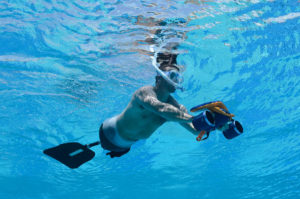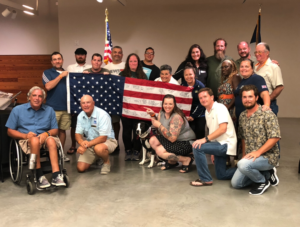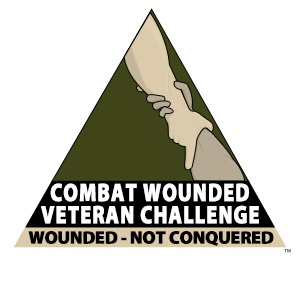Summary of CWVC Activities for 2019
31 December 2019
CWVC conducted three Challenges during 2019: (1) the annual SCUBA Challenge, (2) Colorado Mountaineering Trek, and (3) the Galveston TX Sailing Challenge.
SCUBA Challenge
We concluded our 2019 SCUBA Challenge, our annual “family-oriented” event, the last week in June. We hosted our largest group ever this year with 87 participants (33 of which were first time participants). 22 combat wounded/injured veteran (CW/IV) divers supported by 8 dive professionals (Dive Masters, Dive Instructors), 4 orthotics and prosthetics (O&P) research divers, 3 SCUBA-qualified medical doctors expanding our research efforts, safety support divers, and five boat captains/crews participated in multiple dives over the week-long event supporting Mote Marine Laboratory’s coral reef restoration program in the eastern Gulf of Mexico. Additionally, 31 family members accompanied their CW/IV spouses/parents for the Challenge.

O&P scientists developed prototype equipment to assist combat wounded vets achieve near normal underwater mobility
The Research
We continued our past research activities conducted by O&P scientists. From their work last summer, they designed a single-fin, form-fitted appendage from a body cast for one of our double leg amputee divers. With the fin and a motorized scooter, our CWV diver now has enhanced, near normal underwater mobility; i.e., Vulneror non Vincor – “Wounded, Not Conquered.” They continued taking measurements from sensors attached to CW/IV divers’ bodies and prosthetic devices during controlled dives. Data captured from these dives will contribute to the overall underwater O&P body of knowledge, of interest to not just CW/IVs but underwater adventure advocates in general afflicted with appendage limitations. Just recently our O&P scientists were selected to present the results of their research to the International Society for Prosthetics and Orthotics, a multidisciplinary organization that promotes access to rehabilitation, mobility devices, and other assistive technology to improve the quality of life for people with reduced mobility. A 2019 video captures the essence of what CWVC and our O&P scientists try to do with/for our wounded/injured vets …
“Shelter from the Storm”: https://drive.google.com/file/d/1FdWPx26mefro6xxbQ3mBsAqZlCThI1Lv/view
Post-Challenge Feedback
As you might imagine when a combat wounded/injured veteran returns home, his/her family shares in the physical, emotional, and recovery burden alongside their spouse/parent; their sustained support throughout recovery is critical. Hence our preference to host family members on our Challenges when we’re able, so they can share in the rehabilitative experience together and carry it forward with them post-Challenge. From participant feedback, we’ve found this “family approach” most effective and welcome, as attested in representative comments from some of our Army and Coast Guard vets:
Army CWV, a 22KILL ( https://www.22kill.com ) “survivor” – in other words, considered suicide, but didn’t: “Thank you all for being such inspiring individuals who brought back the feeling of family in my life.”
Army single leg, above the knee amputee CWV: “To be able to come down here and do something that makes a difference in our environment, that makes a difference in the state of Florida … It gives me a mission; it gives me a purpose.”
An Army Special Forces single leg, above the knee amputee CWV: “The fact that I was able to get back in the water, get back to SCUBA diving, which is something I can do for myself and also with the family as a family, it was a tremendous part of my recovery.”
From a Coast Guard PTSD-afflicted vet: “To all who read this, please know what an honor it is to connect. Consider me a 3AM friend, if you ever need to make the call. ✌??”
Colorado Mountaineering Challenge
 The Holy Cross Wilderness of central Colorado was the location of CWVC’s July 2019 mountain adventure challenge. The wilderness is characterized by rugged ridgelines and glacier-carved valleys, spruce-fir forests, cascading streams and dozens of lakes; elevations range from 8,500 feet to over 14,000 feet. The challenge based out of Salida, Colorado where we spent 2 days acclimating to the 8,500 ft. elevation. We enjoyed a local mountain hike and had time for preparing our gear and packs for the upcoming trek. Despite a high residual snowpack, our 8-man team was able to reach high mountain lakes above tree-line, camp in spectacular settings and enjoy the plentiful trout fishing. The route began at the Cross Creek trail-head and continued south along the Cross Creek until reaching its highest point around the cirque of Blodgett Lake. For 5 nights, we enjoyed the beautiful solitude of the Sawatch Mountain Range while pushing physical limits with our 50-pound packs. After the camping trek, we returned to Salida, Colorado for a day of relaxed unpacking and then a full day of white-water rafting on the exciting Arkansas River. The rafting adventure was a great way to close out the Colorado trip before the team returned to their respective homes.
The Holy Cross Wilderness of central Colorado was the location of CWVC’s July 2019 mountain adventure challenge. The wilderness is characterized by rugged ridgelines and glacier-carved valleys, spruce-fir forests, cascading streams and dozens of lakes; elevations range from 8,500 feet to over 14,000 feet. The challenge based out of Salida, Colorado where we spent 2 days acclimating to the 8,500 ft. elevation. We enjoyed a local mountain hike and had time for preparing our gear and packs for the upcoming trek. Despite a high residual snowpack, our 8-man team was able to reach high mountain lakes above tree-line, camp in spectacular settings and enjoy the plentiful trout fishing. The route began at the Cross Creek trail-head and continued south along the Cross Creek until reaching its highest point around the cirque of Blodgett Lake. For 5 nights, we enjoyed the beautiful solitude of the Sawatch Mountain Range while pushing physical limits with our 50-pound packs. After the camping trek, we returned to Salida, Colorado for a day of relaxed unpacking and then a full day of white-water rafting on the exciting Arkansas River. The rafting adventure was a great way to close out the Colorado trip before the team returned to their respective homes.
Post-Challenge Feedback
After the challenge: “The experience and growth I have walked thru with CWVC has brought about much to ponder. After each event my desire to serve the organization and fellow veterans and families grows.”
After the challenge: “I personally struggled with identity when I was leaving the service. My identity was rooted in what I did. CWVC has absolutely given me the ability to connect with my purpose as a man and leader in this life.”
During a break on the trail: “It wasn’t so long ago that I tried to end my life. Being invited to participate with CWVC has saved my life. It sparked a new view of what I could do in my future. I am so grateful…”
Around the campfire: “Since leaving the Army two years ago, I have felt lost. I love my family but being out on the trail with these guys reconnects me to the man I want to be.”
During a steep hiking section: “This trail is kicking my #&^$%! I forgot how much I loved doing this!”
Driving to the airport after the challenge: “Being in the mountains with you guys was exactly what I needed! Thanks so very much!”
Sailing Challenge
 Our seven-day Sailing Challenge ran from 15-21 September 2019 hosted by Sea Star Base Galveston (SSBG) out of southeast Texas. It can be summarized on three levels …
Our seven-day Sailing Challenge ran from 15-21 September 2019 hosted by Sea Star Base Galveston (SSBG) out of southeast Texas. It can be summarized on three levels …
On the sailing and the weather: Tropical Storm Imelda hit Galveston with record rains over extended days (rainfall exceeded 40 inches in 24 hours in some regions). Since each rainy day seemed like the one before (and the day after, too!), CWVC participants found “No Easy Day” (by SEAL Mark Owen). The “Challenge” for SSBG and CWVC became developing alternate plans, which SSBG executed with aplomb. These included a special guest visit from a retired NASA astronaut, and a behind-the-scenes tour of a 1.5-million-gallon aquarium teeming with creatures from tuxedo-clad penguins to seals, stingrays, and sharks. Following the storm’s passing, we enjoyed beautiful sailing weather over SSBG (southeast breezes 14-17 knots under sunny skies). Shore instruction followed by on-the-water drills, skills and racing. Seven teams of three sailors trained for, and then competed in a two-day regatta culminating the challenge-week.
Post Challenge Feedback
On the Impact … the Inspiration …the Purpose of the Sailing Challenge:
— “It’s been an honor and means a lot to me that words just can’t describe how great everyone and everything was. Never Forget!”
— “… the sailing is coupled with competition. I have never been an overt competitor but found myself really wanting to win! I have never really raced anything in life and for some reason racing boats woke the competitor in me.”
— “Give a man a fish and he eats for a day. Teach a warrior to sail; he will have purpose for a lifetime. As a warrior, I learned trained and executed missions. With sailing, the learning, training and executing, all are the mission. Every veteran needs a mission.”
— “There is an element of “family focus” and that is one of the things I love about CWVC. There are so many programs that look to help or heal the veteran but very few that look at the dynamic of the family and how important it is to help the family heal together. The home dynamic is huge, especially for those who suffer from PTS.”
— “The application of sailing principles to real life is about looking up, out … Every movement, be it a sail, rudder, or even redistributing weight has an effect on speed made good. The intentionality of movement requires focus and forethought … something modern life doesn’t always require.”
The Research
Pre-challenge objectives: (1) Conduct a Neuro-Cognitive Assessment (NCA) under the auspices of an Institutional Review Board (IRB) to measure the functionality/performance of the brain (memory, observation, processing, prioritizing, etc.), and (2) conduct a Quality of Life Assessment (QLA) to quantify the mood/emotion of the person. The NCA was conducted on-site at the beginning and end of the Sailing Challenge by medical doctors. The QLA was self-administered before and after the Sailing Challenge, much like others used on previous CWVC challenges. Challenge participants were offered the opportunity to participate in the survey or waive it.
Research results: Overall, ten participants had significant improvements in their NCA scores after the challenge. Two declined, possibly due to fatigue (the last day some of them were mentally and physically exhausted); six had no overall change. Of those who improved, most of them had TBI.
